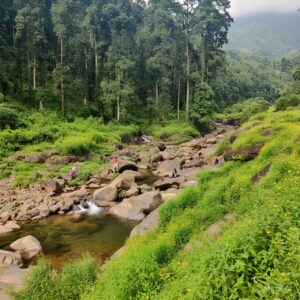
Kerala, often called “God’s Own Country,” is known for its beautiful landscapes, rich culture, and warm hospitality. In recent years, Kerala has also become a role model for responsible tourism in India. Through strong government support and community participation, the state is making tourism more sustainable, inclusive, and eco-friendly.
Let’s explore how Kerala is leading the way in responsible tourism and what it means for travelers, locals, and the environment.
What Is Responsible Tourism?
To begin with, responsible tourism is a form of travel that respects local people, cultures, and the environment. It aims to reduce negative impacts and create positive experiences for everyone involved.
In Kerala, this idea has become a movement. The Responsible Tourism (RT) Mission, launched by the state government, works to connect tourism with local life and sustainability.
Government Support and Big Investments
As a major step forward, the Kerala government has allocated over ₹6 crore to promote responsible tourism in 2025. These funds support various programs designed to make tourism eco-friendly and people-friendly.
1. Eco-Friendly Waste Management
First and foremost, ₹6.01 crore has been set aside for waste management projects, especially for building biogas plants in homestays. These plants will help manage waste effectively and reduce carbon emissions. Importantly, they are being provided to women-led homestays, promoting both environmental protection and women empowerment.
2. Carbon-Neutral Tourism Packages
In addition, Kerala is developing carbon-neutral tourism packages. These packages help reduce the carbon footprint of travelers. For example, kayaking units registered with the RT Mission Society receive ₹40,000 each to adopt sustainable practices like solar lights and eco-boats.
3. Training and Capacity Building
Moreover, ₹75 lakh has been allotted for training programs. These include workshops on:
-
Digital marketing
-
Artificial intelligence in tourism
-
Environmental awareness for students and local leaders
Through such training, both professionals and local communities learn how to keep tourism responsible and profitable.
Cultural Experiences and Local Involvement
Moving on, the Kerala RT Mission also focuses on cultural tourism. The state has earmarked ₹76 lakh for cultural exchange programs and policy workshops. These programs promote projects like:
-
STREET (Sustainable, Tangible, Responsible, Experiential, Ethnic Tourism)
-
PEPPER (People’s Participation for Planning and Empowerment through Responsible Tourism)
-
Model Tourism Villages
By including local traditions, festivals, food, and crafts, visitors get a deeper connection with Kerala’s culture. At the same time, locals benefit from tourism income and skill-building.
Strong Marketing and Outreach
To ensure more people know about these efforts, the government has also sanctioned:
-
₹2 crore for publicity and marketing of the RT Mission
-
₹2 crore for operational costs
With better marketing, Kerala is sharing its success stories and attracting tourists who care about responsible travel.
Women’s Empowerment Through Tourism
Another key area of focus is women’s empowerment. For instance, women running homestays receive support through the biogas program. Additionally, they are trained in hospitality, hygiene, cooking, and customer service.
As a result, many women in Kerala are now proud business owners and contributors to their communities. Their success stories show how tourism can lead to economic independence and social change.
Using Technology for Sustainable Travel
Interestingly, Kerala is also integrating technology into tourism. With help from the Kerala Digital Science Innovation and Technology (K-DISC), the RT Mission is developing tools for:
-
Online booking of local experiences
-
Virtual guides and storytelling
-
AI-based tourist feedback and planning
This shift to smart tourism not only improves visitor experience but also reduces paper use and supports local entrepreneurs.
Tourism That Benefits Everyone
What makes Kerala’s responsible tourism model unique is that it benefits all stakeholders — tourists, locals, the environment, and the economy.
Here’s how:
| Stakeholder | Benefits |
|---|---|
| Tourists | Authentic, meaningful, and eco-friendly experiences |
| Local Communities | Employment, business, and empowerment |
| Environment | Waste reduction, energy savings, and green practices |
| Economy | Sustainable growth and global recognition |
Real Impact: A Look at Village Life
When you travel through Kerala’s villages, you’ll see how tourism supports everyday life. Tourists can:
-
Watch coir-making in local workshops
-
Eat fresh fish at local stalls
-
Visit organic farms or spice gardens
-
Learn crafts from artisans
-
Stay in traditional homestays powered by biogas
All these experiences are built around responsible tourism principles — low impact, high benefit.
How It Helps Family Budgets
Many families in Kerala now depend on tourism-related income. For example:
-
A woman who used to be a homemaker now runs a profitable homestay.
-
A youth trained in RT workshops now works as a local guide.
-
A small farmer supplies fresh vegetables to eco-lodges.
These stories show how even small-scale tourism can bring big changes to local family budgets. With steady income, many families have improved their homes, funded children’s education, and reduced their debt.
What Travelers Can Do
If you’re planning to visit Kerala, you can be a part of this change. Here’s how:
-
Stay in RT-certified homestays or eco-lodges
-
Choose local guides and transport services
-
Avoid plastic and support waste-free tourism
-
Try local food and buy handmade souvenirs
-
Respect local customs and traditions
By making these small choices, you help support a system where tourism brings joy to everyone.
In Conclusion
Kerala’s rise as a responsible tourism hub is not accidental. It is the result of visionary policies, community engagement, and innovative thinking. As the state continues to lead by example, it inspires other regions in India — and around the world — to adopt sustainable tourism practices.
So, when you think of your next travel destination, think beyond just beaches and mountains. Think of a place where your presence makes a difference.

Leave a Reply